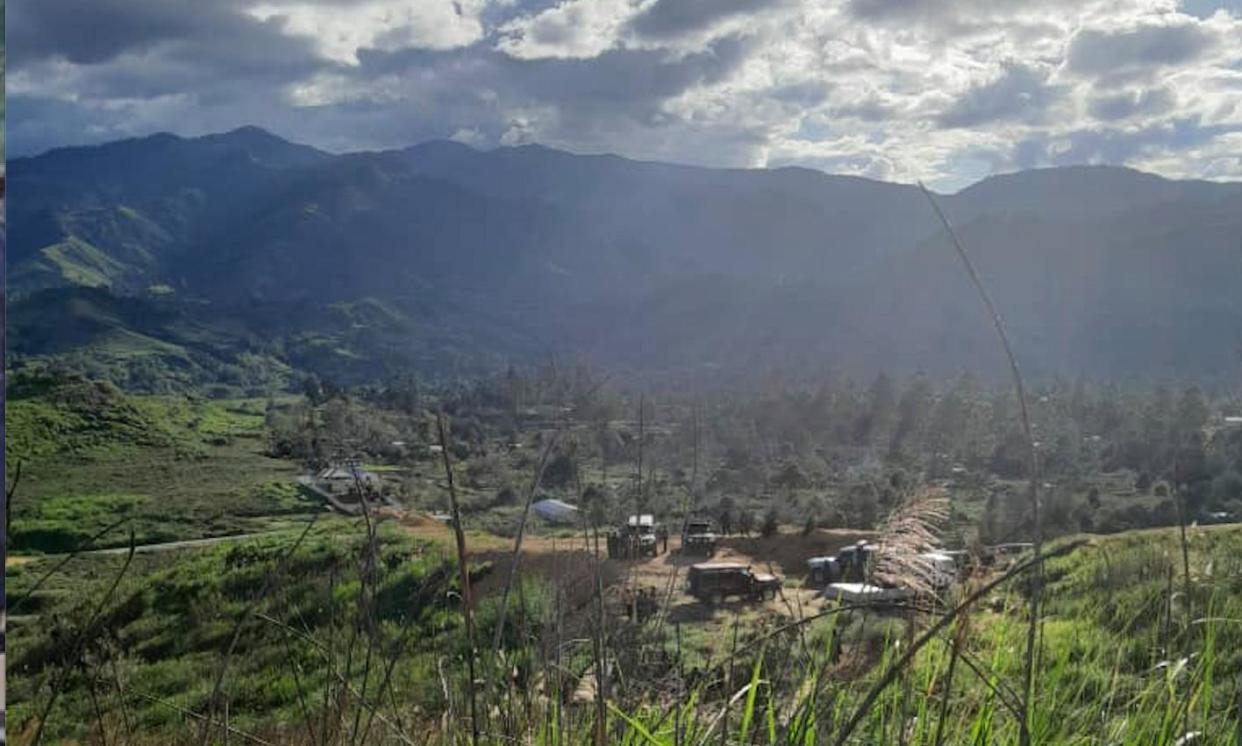Deadly land disputes in PNG highlands leave population in ‘constant fear’

In the lush highlands of Papua New Guinea, tribes are engaged in a bloody conflict that this week left dozens killed in a massacre. An ambush between warring tribes attracted global attention to battles that have been raging, on and off, for years.
But as the province struggles with the spread of high-powered weapons and deep tribal divisions, some feel a sense of helplessness as they wonder how and if the bloodshed can end.
“There is a war going on in here,” says a young woman living in Wapenamanda, the district where Sunday’s ambush took place. She spoke to the Guardian by phone but did not want to be named for fear of reprisal attacks. The woman says many tribes are locked in conflict and have “hundreds of guns.”
Related: The Karida massacre: fears of a new era of tribal violence in Papua New Guinea
Houses and schools have been burnt down. Women and children have fled the area, and now live in other districts. She says the tribes involved “don’t want to surrender” and she worries that if politicians and local leaders don’t come up with a plan to calm tensions, the fighting will get worse.
Long-running conflict
Nineteen tribes are believed to live in the area around Wapenamanda in Enga province. The conflict between them stems from long-running land disputes. It is complicated and governed by customs and beliefs that stretch back generations.
Enga has been the site of mass killings between rival Sikin, Ambulin, Kaekin and other tribes for years, with each retaliatory attack prompting a fresh round of atrocities. Fighting in Wapenamanda began in the early 2000s over land disputes and flared again in 2022, after Papua New Guinea held national elections. Since then, tribal violence has continued, on and off, and escalated again in May 2023 as more tribes joined the fighting. Properties, homes, businesses, churches and cars have been burnt to the ground.
It is not clear how many lives were lost in Sunday’s massacre, or in the conflict more broadly. Authorities have repeatedly revised death tolls from the massacre and on Tuesday, security forces in Enga told the Guardian at least 54 men had been killed. Many believe the true figure is much higher.
Over the years, the national government has tried to address tribal fighting in Enga by increasing the police presence in the province and declaring states of emergency. This week police commissioner David Manning said additional security forces had been sent to Enga, with strengthened powers including authority “to discharge their weapons to save innocent lives and people and property.” Manning said the “acts of barbaric violence … disgust the nation and they demand a hard response.”
“Any tribesman who raises a weapon will more than likely be shot by security forces,” he said.
Still, some in Enga don’t believe more policing is the answer. Enga resident Dr Martin Maliso says there will be retaliation for Sunday’s massacre and fighting of this magnitude is “very difficult to control and contain by any authority unless the warring parties themselves decide to lay down arms.”
“Arresting [the] gunmen won’t stop this. Any actions to arrest will be seen as an act for support for the other team or party,” Maliso says.
He believes all the elected leaders “can do is to plead for the fight to be stopped including holding peace talks between the warring tribes.”
‘We have lost so many lives’
While tribal fighting it not unusual in parts of Papua New Guinea, the conflict has become more deadly as more sophisticated weapons have become available. Guns, machetes and hand grenades are used in the fighting.
“Weapons have moved on from arrows to high-powered guns that are sadly far more destructive. Will it end now? I doubt it,” says Papua New Guinea anthropologist Dr Linus Digim’rina.
“Things will settle down for sure, but only for a while,” Dr Digim’rina says, adding the cycle is difficult to break.
Enga governor Sir Peter Ipatas has called on the government to bring in the Australian federal police to address the ongoing law and order issues in his province.
Ipatas, who has made this request for years, says the government must give immunity to Australian authorities to come and assist with policing “not just in Enga, but across the country”.
“Tribal fights after tribal fights, we have lost so many lives, so many businesses, our people live in constant fear, and they shouldn’t have to because their government is supposed to create a safe environment for them,” he says.
Still, others are sceptical that outside forces could play a role in ending the violence.
“Australian police force would be the last thing for any wise person to turn to for remedial help. Its mitigative methods are simply out of touch with the cultural contexts of Engan fights,” Digim’Rina says.
Rebecca Kuku is a reporter with the National, based in Port Moresby, Papua New Guinea.

 Yahoo News
Yahoo News 
